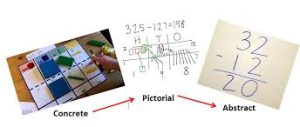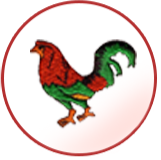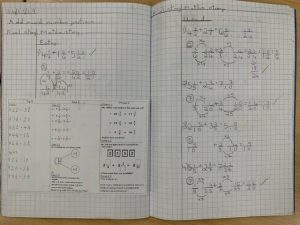
Intent
 For every child to develop a love for the challenges that the subject of Maths brings. We aim to use outdoor learning to enhance mathematical understanding and provide open-ended investigations to promote mathematical reasoning. We strive to ensure that children are provided with opportunities to explore Maths in a real-life context equipping them with the skills in calculation, reasoning and problem solving that they need in life beyond school.
For every child to develop a love for the challenges that the subject of Maths brings. We aim to use outdoor learning to enhance mathematical understanding and provide open-ended investigations to promote mathematical reasoning. We strive to ensure that children are provided with opportunities to explore Maths in a real-life context equipping them with the skills in calculation, reasoning and problem solving that they need in life beyond school.
Implementation
 We believe that learning is the long-term retention of skills and knowledge and the ability to transfer it to new contexts and that children learn best by having opportunities to revisit previous learning. We teach maths every day where learning time includes the practise and the development of factual, conceptual and procedural knowledge. We recognise regular learning and practise as essential in order to develop a rapid recall of number facts, efficiency in procedures and a deepened knowledge of mathematical concepts. Therefore, our curriculum is planned progressively, allowing children to build on their previous knowledge so that they can fully immerse themselves and have opportunities to reflect and build on prior learning. Our long term plan allows each class to develop their prior learning from the previous year. The key knowledge and skills that children acquire and develop throughout each year have been mapped to ensure progression between year groups throughout the school.
We believe that learning is the long-term retention of skills and knowledge and the ability to transfer it to new contexts and that children learn best by having opportunities to revisit previous learning. We teach maths every day where learning time includes the practise and the development of factual, conceptual and procedural knowledge. We recognise regular learning and practise as essential in order to develop a rapid recall of number facts, efficiency in procedures and a deepened knowledge of mathematical concepts. Therefore, our curriculum is planned progressively, allowing children to build on their previous knowledge so that they can fully immerse themselves and have opportunities to reflect and build on prior learning. Our long term plan allows each class to develop their prior learning from the previous year. The key knowledge and skills that children acquire and develop throughout each year have been mapped to ensure progression between year groups throughout the school.
Maths Teaching in school consists of:

- Retrieval Practice – Independent and guided practice of previously taught concepts, facts and procedures.
- Fluency Development – A fast-paced recall of facts and arithmetic skills to develop fluency and efficiency.
- Mastery Teaching – Units of teaching broken down into small, focused steps of learning to support learning, provide opportunity for practice and encourage purposeful application.
Subject expertise allows the intentions of our mathematics curriculum to be executed successfully. CPD is important in maths and all staff are encouraged to raise any issues they have within mathematics in order to ensure everyone is confident in what they teach. Good practice is always shared between staff and all CPD is used to inform teaching and learning across school.

Resources and equipment are audited and up to date. Our resources allow us to better use models and images to support learning in each area. Children are familiar with these and able to access them independently where needed supporting learning in different contexts.
Staff have several materials to refer to for short-term planning including White Rose Maths, Classroom Secrets, Mathletics, Enrich and NCETM Teaching for Mastery – these are used across KS1 and KS2 allowing children to be exposed to a variety of different types of learning and problems.
 Teachers also implement the schools agreed calculations policy for progression in written and mental calculations. Our year group Rising Stars tests help teachers to gather an understanding of their pupil’s existing understanding of topics. Formative assessment is incredibly important at Cockfield Primary School where we focus on challenge questions, analysis of learning, extension work, mini plenaries and discussion with peers. There is coherent progression seen in planning within each unit and activities in EYFS develop knowledge and skills of key learning.
Teachers also implement the schools agreed calculations policy for progression in written and mental calculations. Our year group Rising Stars tests help teachers to gather an understanding of their pupil’s existing understanding of topics. Formative assessment is incredibly important at Cockfield Primary School where we focus on challenge questions, analysis of learning, extension work, mini plenaries and discussion with peers. There is coherent progression seen in planning within each unit and activities in EYFS develop knowledge and skills of key learning.
Mathematical vocabulary is continually referred to within lessons and is discussed with children who are encouraged to use it independently. Children are given opportunity to reason and solve problems regularly; learning is varied and allows for deep and secure understanding. Both greater depth and struggling learners are given small group intervention in order to ensure every child is reaching their full mathematical potential. Using the school’s tracking system is reviewed termly and target children are selected for further support. Parents are informed of and encouraged to be involved in our school mathematics implementation through maths homework, parents’ evenings and yearly reports. Teachers are also all available for parents to speak to both before and after school.
Teachers develop fluency through practising key skills, repeating, reinforcing and  revising which is all built in to formal planning across school. Children are given time to practice and perfect their calculation strategies including giving pupils opportunity to make appropriate decisions when estimating, calculating and evaluating the effectiveness of their chosen methods. Feedback including our whole school ‘next steps’ system is designed to ensure pupils are well informed and making visible progress.
revising which is all built in to formal planning across school. Children are given time to practice and perfect their calculation strategies including giving pupils opportunity to make appropriate decisions when estimating, calculating and evaluating the effectiveness of their chosen methods. Feedback including our whole school ‘next steps’ system is designed to ensure pupils are well informed and making visible progress.
Discussion is essential to our learning and time is planned into lessons for this, task types are varied to suit different pupils and their learning preferences whilst reasoning in writing remains one of our key focuses. Investigative tasks are designed to allow pupils to follow lines of enquiry and develop their own ideas, justifying and proving their answers. Children work both collaboratively and independently solving problems, which require them to persevere and develop resilience.
Maths in Early Years
 Our children start their learning journey in nursery and reception where they develop a strong grounding in number and develop the necessary building blocks to excel mathematically. We provide children with frequent and varied opportunities to build and apply their understanding of number and the relationships between and the patterns within them. We provide rich opportunities for children to develop their spatial reasoning skills across all areas of mathematics including shape, space and
Our children start their learning journey in nursery and reception where they develop a strong grounding in number and develop the necessary building blocks to excel mathematically. We provide children with frequent and varied opportunities to build and apply their understanding of number and the relationships between and the patterns within them. We provide rich opportunities for children to develop their spatial reasoning skills across all areas of mathematics including shape, space and
measures. We aim to develop positive attitudes and interests in mathematics, teach children to look for patterns and relationships, spot connections, ‘have a go’, and talk to adults and peers about what they notice and not be afraid to make mistakes.
Children learn about maths through play and their daily experiences. And the more meaningful to them and hands on it is, the better. Concrete manipulatives and pictorials are used to represent new concepts to the children supporting their conceptual understanding. The use of hooks and real life problems is used to support the deeper understanding of the mathematical concept. Both indoor and outdoor areas are full of mathematical opportunities including lots of exciting things for children to explore, sort, compare, count, calculate and describe. This ensures we support them to be creative, resilient, critical thinkers, problem solvers and to have a go.
Impact
 The impact of our mathematics curriculum is that children understand the relevance of what they are learning in relation to real world concepts. We have fostered an environment where Maths is fun and it is OK to be ‘wrong’ because the journey to finding an answer is most important. Our children have a growth mindset and they make measurable progress against their own targets. Our maths books are packed with a range of activities showing evidence of fluency, reasoning and problem solving. Our feedback and interventions are supporting children to strive to be the best mathematicians they can be ensuring a greater proportion of children are on track. Children ‘have a go’ and choose the equipment they need to help them to learn along with the strategies they think are best suited to each problem. Children are developing skills in being articulate and are able to verbally, pictorially and in written form, reason well. Our school standards are high; we moderate our books both internally and externally and children are achieving well.
The impact of our mathematics curriculum is that children understand the relevance of what they are learning in relation to real world concepts. We have fostered an environment where Maths is fun and it is OK to be ‘wrong’ because the journey to finding an answer is most important. Our children have a growth mindset and they make measurable progress against their own targets. Our maths books are packed with a range of activities showing evidence of fluency, reasoning and problem solving. Our feedback and interventions are supporting children to strive to be the best mathematicians they can be ensuring a greater proportion of children are on track. Children ‘have a go’ and choose the equipment they need to help them to learn along with the strategies they think are best suited to each problem. Children are developing skills in being articulate and are able to verbally, pictorially and in written form, reason well. Our school standards are high; we moderate our books both internally and externally and children are achieving well.
Maths Long Term Overview KS1
Maths Long Term Overview KS2
Maths Calculation Guidance
Maths Calculation – Progression of Skills

